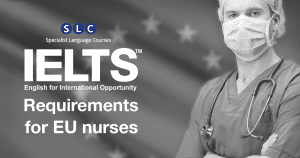What is the impact of new IELTS English language requirements for EU nurses?
As of January 18th, all EU nurses applying to work in the UK need to show they have an advanced level of English, so guaranteeing their ability to provide safe and effective practice. See the BBC news article for details.
Following a consultation last summer, the NMC decided that all nurses from the EU who had not trained or worked in an English language environment would need IELTS 7.0 to demonstrate their English competence.
For many, IELTS is a controversial choice as it is an academic English exam which does not test the English specific to Nursing or Healthcare. Many worry that its introduction will negatively impact on overseas recruitment and therefore exacerbate existing nurse shortages across the UK.
How tough are the new language requirements?
Well, ask those hundreds of Filipino nurses who studied a nursing degree in English and still fail to hit 7.0 in the IELTS English test – the level now required for nurses coming from the EU applying to work in the UK under new NMC rules.
The new requirement is undoubtedly tough. 7.0 is advanced level language competence – C1 in the Common European Framework. A score of 7.0 in the 4 papers of the IELTS test – Writing, Speaking, Listening and Reading – is what most university Masters programmes in the UK require of overseas applicants.
Why is IELTS difficult for nurses?
- It’s an academic English test, devised in the 1980s, for international students wanting to study in an English-speaking university. Academic English is not the same as Nursing or Medical English.
- To score 7.0, candidates need to know many words that are not commonly used in English, let alone on a hospital ward. They also need to show they can use complex grammar and sophisticated ways of connecting different clauses within longer sentences.
- Time pressure. Candidates need to plan and write over 400 words in 2 essays in an hour. They need to read up to 6,000 words from academic texts and answer a range of questions, some very tricky, in an hour. They need to discuss abstract ideas clearly in their speaking test.
- Passing any exam requires an understanding of what techniques and strategies work effectively. For an academic exam like IELTS, where candidates don’t have much time, this is crucial and these take time to learn and practise.
- Achieving 7.0 in all 4 IELTS papers requires candidates to do all of the above – to learn academic English forms and phrasing, acquire an expansive vocabulary and command of complex grammar, work accurately at speed, and to learn a range of essential exam techniques. This requires a lot of practice to build the necessary knowledge, skills and confidence.
The British Council, who part-own the IELTS test, estimate that a typical candidate needs to study for around 200 hours to move up 1 band, eg from 6.0 to 7.0. As most EU nurses hoping to work in the UK would typically benchmark at 4.5 – 5.0, many have a long way to go before achieving the 7.0 stated by the NMC.400 to 500 hours in fact.
Is IELTS 7.0 posssible?
In short, yes. Not easy, not overnight, but possible. This is not the end of EU nurse recruitment as we know it in our opinion.
An estimated 2.6 million candidates took IELTS last year alone. Not surprisingly, there is a wealth of materials, trainers, and experts available. There are online sites, libraries of books, English language schools running course after course. A proper IELTS industry in many respects, generating millions every year.
It’s not exactly straightforward, especially given the financial constraints facing the NHS and also individual nurses. However, investing wisely in the right trainers, materials and course structure optimises what is possible and enables candidates to progress toward what they need.
How we can help
At SLC, we offer targeted IELTS preparation courses for nurses wanting to relocate to the UK. We combine online tuition with specialists and the best in self-study to enable nurses to achieve 7.0 quickly and effectively. We map courses to the recruitment process, delivering both in-country and in-UK, and layer courses in such a way as to maximise first time pass rates.
Contact us to find out more, or feel free to call us on 01273 900213.



